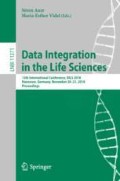Abstract
Systems biology aims at understanding an organism in its entirety. This objective can only be achieved with the joint effort of specialized work groups. These collaborating groups need a centralized platform for data exchange. Instead data is often uncoordinatedly managed using heterogeneous data formats. Such circumstances present a major hindrance to gaining a global understanding of the data and to automating analysis routines.
DISBi is a framework for creating an integrated online environment that solves these problems. It enables researchers to filter, integrate and analyze data directly in the browser. A DISBi application dynamically adapts to its data model. Thus DISBi offers a solution for a wide range of systems biology projects.
An example installation is available at disbi.org. Source code and documentation are available from https://github.com/DISBi/django-disbi.
Access this chapter
Tax calculation will be finalised at checkout
Purchases are for personal use only
References
Bauch, A., et al.: openBIS: a flexible framework for managing and analyzing complex data in biology research. BMC Bioinform. 12(1), 468 (2011). https://doi.org/10.1186/1471-2105-12-468
Bugacov, A., Czajkowski, K., Kesselman, C., Kumar, A., Schuler, R.E., Tangmunarunkit, H.: Experiences with DERIVA: an asset management platform for accelerating eScience. In: Proceedings of the 13th IEEE International Conference on eScience, eScience 2017, pp. 79–88 (2017). https://doi.org/10.1109/eScience.2017.20
Fuchs, S., et al.: Aureolib - a proteome signature library: towards an understanding of staphylococcus aureus pathophysiology. PLoS One 8(8), e70669 (2013). https://doi.org/10.1371/journal.pone.0070669
Hunter, J.D.: Matplotlib: a 2D graphics environment. Comput. Sci. Eng. 9(3), 99–104 (2007). https://doi.org/10.1109/MCSE.2007.55
Jones, E., Oliphant, T., Peterson, P.: SciPy: open source scientific tools for Python (2014)
Kitano, H.: Systems biology: a brief overview. Science 295(5560), 1662–1664 (2002). https://doi.org/10.1126/science.1069492
Lubitz, T., Hahn, J., Bergmann, F.T., Noor, E., Klipp, E., Liebermeister, W.: SBtab: a flexible table format for data exchange in systems biology. Bioinformatics 32(16), 2559–2561 (2016). https://doi.org/10.1093/bioinformatics/btw179
Rocca-Serra, P., et al.: ISA software suite: supporting standards-compliant experimental annotation and enabling curation at the community level. Bioinformatics 27, 2354–2356 (2011). https://doi.org/10.1093/bioinformatics/btq415
Schuler, R.E., Kesselman, C., Czajkowski, K.: Accelerating data-driven discovery with scientific asset management. In: 2016 IEEE 12th International Conference on e-Science (e-Science), pp. 31–40. IEEE (2016). https://doi.org/10.1109/eScience.2016.7870883
Taylor, C.F., et al.: Promoting coherent minimum reporting guidelines for biological and biomedical investigations: the MIBBI project. Nat. Biotechnol. 26(8), 889–896 (2008). https://doi.org/10.1038/nbt.1411
Van Der Walt, S., Colbert, S.C., Varoquaux, G.: The NumPy array: a structure for efficient numerical computation. Comput. Sci. Eng. 13(2), 22–30 (2011). https://doi.org/10.1109/MCSE.2011.37
Wolf, J., et al.: A systems biology approach reveals major metabolic changes in the thermoacidophilic archaeon Sulfolobus solfataricus in response to the carbon source L-fucose versus D-glucose. Mol. Microbiol. 102(5), 882–908 (2016). https://doi.org/10.1111/mmi.13498
Wolstencroft, K., et al.: The SEEK: a platform for sharing data and models in systems biology. Methods Enzymol. 500, 629–655 (2011). https://doi.org/10.1016/B978-0-12-385118-5.00029-3
Wruck, W., Peuker, M., Regenbrecht, C.R.A.: Data management strategies for multinational large-scale systems biology projects. Brief. Bioinform. 15(1), 65–78 (2014). https://doi.org/10.1093/bib/bbs064
Acknowledgements
The authors thank Meina Neumann-Schaal for critical reading of the manuscript and four anonymous reviewer for their instructive comments. Rüdiger Busche thanks Pascal Nieters for support in the publication process.
This work was supported by the Federal State of Lower Saxony, Niedersächsisches Vorab (VWZN2889)/3215.
Author information
Authors and Affiliations
Corresponding author
Editor information
Editors and Affiliations
Rights and permissions
Copyright information
© 2019 Springer Nature Switzerland AG
About this paper
Cite this paper
Busche, R., Dannheim, H., Schomburg, D. (2019). DISBi: A Flexible Framework for Integrating Systems Biology Data. In: Auer, S., Vidal, ME. (eds) Data Integration in the Life Sciences. DILS 2018. Lecture Notes in Computer Science(), vol 11371. Springer, Cham. https://doi.org/10.1007/978-3-030-06016-9_10
Download citation
DOI: https://doi.org/10.1007/978-3-030-06016-9_10
Published:
Publisher Name: Springer, Cham
Print ISBN: 978-3-030-06015-2
Online ISBN: 978-3-030-06016-9
eBook Packages: Computer ScienceComputer Science (R0)

